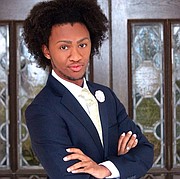I am black, Christian, genderqueer and gay. I chose to be neither the former, nor the latter; it is a gift. None of my identities contradicts the other, despite which agenda society is currently pushing.
I am often faced with the decision of which oppression to overcome first. What good is it to have the ability to marry the person of my choosing if we are more likely to be incarcerated than our white counterparts? Is it really progression to be protected as an African American if I am not protected as a gay American? Although the answers to these questions may lie at the end of pi, they are ever-present in the lives of double or triple minorities.
As a self-proclaimed advocate, I often ask myself which I fight for first. Which of my minorities is more important? In order to efficiently dissect this unfair but realistic question, I must look back to Maslow's Hierarchy of Needs. I need to be safe first as a black, gay, genderqueer man. So, please pardon me if I am more passionate about the reformation and regulation of policing and the criminal-justice system than I am about marriage equality for all. I think it is tasty ear sugar to say that African Americans are equal, but the incarceration rates and diminishing strength of affirmative action shows otherwise. Is it acceptable to highlight one minority's struggle for a comparable quality of life while another minority is being lawfully enslaved at alarming rates?
To be clear, all injustice must cease. However, as a black man, I honestly feel slighted that one of the most privileged populations found one way they are not privileged, and that "struggle" supersedes the headlines of police killing African Americans with little recourse. Because of my rearing, the thought of marriage manifests after I am safe, educated, employed and have some form of wealth. Each of those steps is a struggle for people who look like me. Consequently, progression that seemingly affects the same gender-loving individuals equally does not do so in reality. The quality of life means nothing to a corpse.
It is important to note that while I understand the multiple means of oppression as a black, gay, Christian, genderqueer man, I also understand the slight privilege I have. There is a population that has been enslaved by her captor, raped by her owner, hypersexualized by her rapist, robbed of her offspring by economics, helped by her oppressor, handicapped by her helper and beaten by everyone. When will she see equality?
No inequality should exist. There should be no conversation about who is oppressed more or who should be liberated first. In reality, however, it feels as if only one stride can be made at a time. It is painful to be picked last for the team when the team means equality.
Ryvell D. Fitzpatrick is the legal intern for the ACLU of Mississippi and a student at the Howard University School of Law.


